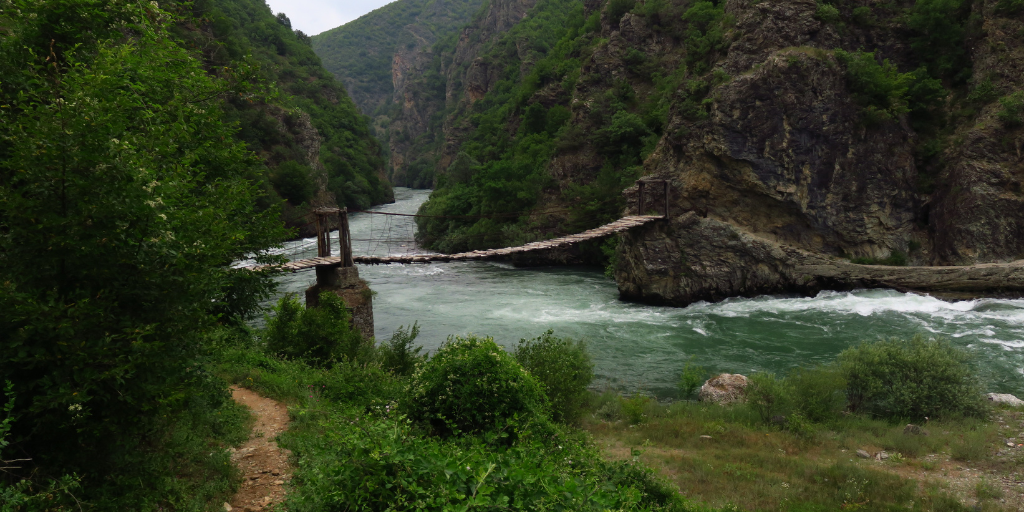Skavica mega dam: Albanian court to scrutinise special law for U.S. contractor Bechtel
Nature conservation and human rights organisations have secured an important first milestone in the fight against the planned 210 MW Skavica hydropower plant in the Albanian municipalities of Kukës and Dibër.
21 September 2023

A stretch of the Drin river that could be flooded by the Skavica dam, Photo: Andrey Ralev
Joint press release by EuroNatur, CEE Bankwatch, Black Drin Association and Group of Rural Activists of Dibra
Radolfzell, Prague, Tirana – Nature conservation and human rights organisations have secured an important first milestone in the fight against the planned 210 MW Skavica hydropower plant in the Albanian municipalities of Kukës and Dibër: a constitutional complaint submitted by the Albanian Helsinki Committee and the Black Drin Association, with the support of EuroNatur and CEE Bankwatch Network, has now been accepted for trial in public plenary. The complaint alleges, amongst other things, the violation of the principles of legal equality and economic freedom in the award of public contracts.
This ruling is a major step forward, as only 15 per cent of all cases submitted to the Albanian constitutional court are eventually considered admissible, and they rarely include submissions by civil society organisations.
The contract for preliminary works and project documentation for the highly controversial Skavica dam was awarded to the U.S. construction giant Bechtel in July 2021, seemingly without any tender procedure. This followed parliamentary approval of a special law which specifically mentions Bechtel.
‘By circumventing open procurement and competition, this deal raises risks of possible corruption and doubts about the value for money of the project. It also undermines the meaningfulness of the environmental and social impact assessment,’ fears Andrey Ralev, Biodiversity Campaigner at CEE Bankwatch Network.
In addition to the lack of transparency, there is still no official information about the exact construction and location of the dam. Four technical scenarios are currently being considered, according to KESH, Albania’s state-owned energy utility and promoter of the Skavica project. The largest one involves a dam 147 metres high and a reservoir with a capacity of 2.32 billion cubic metres, which would make it one of Europe’s largest man-made reservoirs.
‘With 41 villages and more than 2500 houses in Dibër municipality threatened by the project, Skavica’s social impacts may be among the worst of any dam built in Europe in the 21st century. Residents have been fighting against Skavica for years. The vast majority doesn’t want the dam,’ says Majlinda Hoxha, coordinator of the Group of Rural Activists of Dibra.
Skavica’s ecological consequences would also be devastating, particularly for the critically endangered Balkan lynx.
‘The dam would disrupt the only bio-corridor between Albania and North Macedonia where the two remaining viable reproductive lynx populations cross,’ says Dr Amelie Huber, Freshwater Project Manager at EuroNatur. ‘Skavica would also flood what could be Albania’s largest floodplain forest, meaning that an array of biodiversity and habitats and a huge carbon sink would be lost. These impacts invalidate any argument that Skavica would drive green and climate-friendly energy development,’ concludes Huber.
Background information:
- The Skavica dam would flood the last free-flowing stretch of the Black Drin River in Albania which originates from Lake Ohrid, in North Macedonia, and flows into the Adriatic Sea. Plans for the project date back to the 1960s, when Skavica was conceptualised as part of the Drin Cascade comprising three other large hydropower plants, which are already in operation.
- The financial costs of the project have risen four times to over a billion euros but financing has not been secured yet. Bechtel has gained notoriety in the region and globally for its involvement in various unsuccessful and/or overpriced projects, often awarded without tender processes.
- The Skavica reservoir would submerge much of the impoverished but historic region of Dibra, a long, fertile, and scenic valley surrounded by snow-capped mountains. In recent years it has emerged as a hub for ecotourism and organic farming, partly subsidised by the Albanian government.
Contact:
Anika Konsek, EuroNatur: anika.konsek(at)euronatur.org, phone: +49 (0) 7732 9272 22
Andrey Ralev, CEE Bankwatch Network: andrey.ralev(at)bankwatch.org, phone: +35 9 8842 685 52
Majlinda Hoxha, Group of Rural Activists of Dibra/Black Drin Association: lindahoxha83(at)gmail.com, phone: +35 5674 8755 06
Never miss an update
We expose the risks of international public finance and bring critical updates from the ground – straight to your inbox.
Theme: Hydropower
Location: Albania
Project: Protecting rivers and communities | Protecting rivers and communities in southeast Europe
Tags: hydropower
